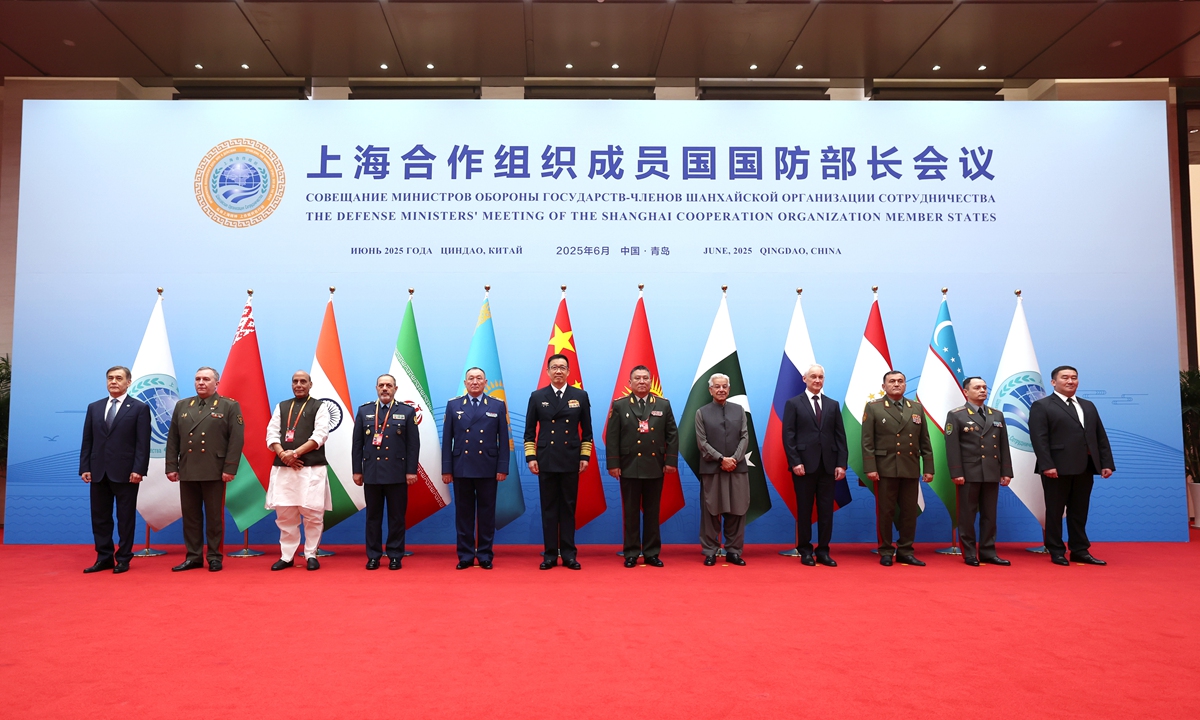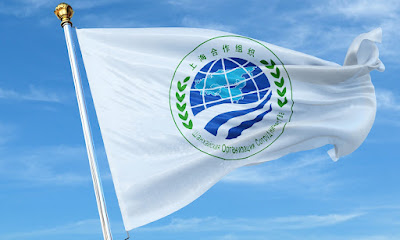
Defense ministers from all 10 member countries of the Shanghai Cooperation Organization (SCO) gather for a group photo ahead of the Defense Ministers' Meeting of the SCO member states in Qingdao, East China's Shandong Province on June 26, 2025. Photo: cnsphoto
From Wednesday to Thursday, the meeting of Ministers of Defense of the Shanghai Cooperation Organization (SCO) Member States was held in Qingdao, East China's Shandong Province, drawing extensive international attention. This is because the meeting not only served as a "warm-up event" for the Tianjin SCO Summit this year, but also achieved the "full attendance" of all 10 defense ministers. Amid a complex and turbulent regional and international landscape, the SCO provided member states with a spacious roundtable - highlighting its value in building consensus, narrowing divisions and promoting solidarity.With Belarus attending the defense ministers' meeting as an SCO member for the first time, Iran's defense minister visiting China just after the Iran-Israel ceasefire as well as India's defense minister visiting China for the first time in five years and "appearing together" with Pakistan's defense minister for the first time after the India-Pakistan conflict - the trust shown by these defense leaders in the SCO underscores the precious coordination and cohesion of this multilateral security organization amid global turbulence. Today's international environment is marked by an acute shortage of public security goods, a glaring security deficit and weakened authority of international organizations - making finding a calm table for dialogue not an easy task. However, the SCO has provided a valuable platform for member states to "seek common ground while resolving difference" and an occasion to forge multilateral consensus. It has not only effectively acted as a "glue" between member states, but has also become a "ballast stone" for regional peace.
Notably, the SCO defense ministers' meeting in Qingdao was held almost simultaneously with the NATO summit in The Hague. On Wednesday, Pakistan's Defense Minister Khawaja Muhammad Asif said that unlike NATO, the SCO can "further the peace in this region." China's Defense Minister Dong Jun emphasized that at a time when the international situation is intertwined with changes and turmoil, it is particularly important for the SCO to play the role of a "stabilizing anchor."
While NATO seeks to prove its "value to exist" by searching for so-called "imaginary enemies" worldwide, the SCO's philosophy of "not being an alliance directed against other states and regions" and "adhering to the principle of openness" offers a new approach to global security governance. The "Shanghai Spirit" based on mutual trust, mutual benefit, equality, consultation, respect for diverse civilizations and pursuit of common development has lit up the path toward the construction of an equitable and orderly multipolar world order.
Now in its 25th year, the SCO has expanded from its original six founding members into a "big family" of 10 member states, two observer states, and 14 dialogue partners - stretching from the East European plains to the Indian Ocean and the Pacific Rim, and encompassing nearly half of the world's population.
The SCO has become a mature platform for regional security cooperation, with continuously growing influence, cohesion and appeal. Over the past 25 years, this "giant ship of security" has been riding the waves against terrorism, separatism and extremism, making outstanding contributions to regional security. The economic and trade dividends and people-to-people exchanges emerging from security cooperation have also been remarkable, significantly bringing the peoples of the member states closer together in all aspects.
At last July's SCO Summit in Astana, President Xi Jinping proposed five suggestions to jointly build a more promising home of the SCO, sending out the "SCO voice" of solidarity and mutual trust as well as common prosperity and revitalization. As the rotating chair of the SCO for 2024-2025, China remains a pillar of the organization. It champions the Five Principles of Peaceful Coexistence, and has put forward a vision of common, comprehensive, cooperative and sustainable security. It opposes the outdated "beggar-thy-neighbor" strategies and zero-sum mindset, and reaffirms that the security concerns of every nation - big or small - deserve respect. These principles have resonated both within the SCO and globally. From joint counterterrorism drills to intelligence sharing, from economic cooperation to cultural exchanges, the SCO addresses challenges through multilevel collaboration, offering "SCO solutions" to global security issues. It exemplifies the right way for different civilizations to engage with each other, and is helping forge a new type of international relations based on mutual respect, fairness, justice, and win-win cooperation.
From enhancing strategic communication to advancing pragmatic cooperation, the SCO defense ministers' meeting in Qingdao showcased the organization's growth and commitments in the past 25 years. Facts have proven that the SCO is a vital force in maintaining regional peace and stability, and an important platform for building a community with a shared future for mankind. This year, within the SCO framework, China will host more than 100 meetings and events - polishing the "SCO Spirit" with "Chinese actions," and further deepening SCO practical cooperation in various areas. The world looks forward to the SCO paving a new security path for the future of a multipolar world and economic globalization. - Global Times editorial
Related posts:



No comments:
Post a Comment